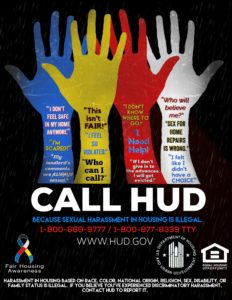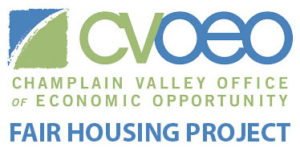 April is Fair Housing Month, a time to celebrate the anniversary of the passage of the Fair Housing Act in April, 1968. It’s also a reminder of the persistent discrimination that happens every day all over the country and the need to take action to strengthen protections for vulnerable populations.
April is Fair Housing Month, a time to celebrate the anniversary of the passage of the Fair Housing Act in April, 1968. It’s also a reminder of the persistent discrimination that happens every day all over the country and the need to take action to strengthen protections for vulnerable populations.
Especially now, as more and more people are facing housing instability due to loss of income and health concerns, it is imperative that those affected by the COVID-19 crisis are safe, stably-housed, and protected against discrimination.
Survivor of domestic and sexual violence are at particular risk for discrimination where they live and when they try to find new homes. This risk is amplified during times of crisis. There is a strong link between domestic violence and homelessness and the lack of alternative housing often prevents people from leaving abusive relationships and unsafe situations.
New Protections in Vermont
In 2019, Vermont followed the lead of California and a few other states to add specific protections for victims of domestic and sexual violence to its fair housing law. Thanks to advocacy by domestic violence and affordable and fair housing champions, Act 48 added “victims of abuse, sexual assault, or stalking” to Vermont’s protected classes. The full act also includes new language related to rights to terminate rental agreements, safety measures, and confidentiality based on fear or imminent harm to any protected tenant due to abuse, sexual assault, or stalking.
“Victims of domestic and sexual violence experience real challenges and barriers to getting or keeping stable, affordable housing,” explained Sarah Robinson, Deputy Director of the Vermont Network Against Domestic and Sexual Violence, which led the advocacy efforts. This new law gives survivors protections they need to be safe at home and move on with their lives. A key piece of the legislation is that people can self-certify their victim status.
Fair Housing is Your Right
The Fair Housing Act (Title VIII of the Civil Rights Act of 1968, as amended) makes it illegal to discriminate in the availability and enjoyment of housing and housing-related services, facilities, and transactions because of race, color, national origin, religion, sex, disability, and familial status. The Act prohibits a wide range of discriminatory housing and related practices, including, among other things, making discriminatory statements, refusing to rent or sell, denying access to services, setting different terms or conditions, refusing to make reasonable modifications or accommodations, discriminating in residential real estate-related transactions, and retaliating.
In addition to the new protected class for victims of abuse, sexual assault, and stalking, Vermont has added protections based on age, sexual orientation, gender identity, marital status, receipt of public assistance, and denial of development permitting based on the income of prospective residents.
Sexual Harassment in Housing
Sexual harassment is a form of sex discrimination and covered under the Fair Housing Act. Low-income residents and people in protected classes are at a high risk for sexual harassment by housing providers because they often have limited housing choices and face difficulties leaving unsafe housing situations. Often, victims of sexual harassment will endure the harassment out of fear of losing their housing.
This harassment can take the form of a housing provider requiring a person to engage in sexual conduct as a condition of obtaining or maintaining housing or related services. For example:
- A landlord tells an applicant she won’t rent him an apartment unless he has sex with her.
- A property manager evicts a tenant after she refuses to perform sexual acts.
- A maintenance man refuses to make repairs unless a tenant gives him nude photos of herself.
Hostile environment harassment is also covered under fair housing law. This can take the form of a housing provider subjecting a person to unwelcome sexual conduct that interferes with the sale, rental, availability, or terms, conditions, or privileges of housing or related services. For example:
- A landlord subjects a tenant to unwelcome touching, kissing, or groping.
- A property manager makes unwelcome, lewd comments about a tenant’s body.
- A maintenance man sends a tenant sexually suggestive texts and enters her apartment without invitation or permission.
Sexual harassment in housing is not something to be tolerated or endured. We must fully enforce this violation of the Fair Housing Act and protect our most vulnerable residents – especially when they are facing challenges and isolation related to COVID-19.
 If you have experienced sexual harassment in housing – or any other violation of your fair housing rights – contact the Fair Housing Project at fhp@cvoeo.org or 802-660-3456 x 106.
If you have experienced sexual harassment in housing – or any other violation of your fair housing rights – contact the Fair Housing Project at fhp@cvoeo.org or 802-660-3456 x 106.
For legal advice or to file a complaint, contact:
 Vermont Legal Aid / Law Services of Vermont: Leave a message at 1-800-889-2047 or fill out a request form at https://vtlawhelp.org/vlh-intake and a staff member will respond as soon as possible, usually between one and three days.
Vermont Legal Aid / Law Services of Vermont: Leave a message at 1-800-889-2047 or fill out a request form at https://vtlawhelp.org/vlh-intake and a staff member will respond as soon as possible, usually between one and three days.
![]() Vermont Human Rights Commission: Call 802-828-1625 or 1-800-416-2010, or fill out the questionnaire at https://hrc.vermont.gov/how-to-file.
Vermont Human Rights Commission: Call 802-828-1625 or 1-800-416-2010, or fill out the questionnaire at https://hrc.vermont.gov/how-to-file.
Learn more about April Fair Housing Month activities in Vermont at https://fairhousingmonthvt.org/get-involved
April Fair Housing Month activities are made possible with the support of the Champions of Affordable Inclusive Housing and the U.S. Department of Housing and Urban Development (HUD).
Very important information. Thanks for this blog!
Thank you, Ted!